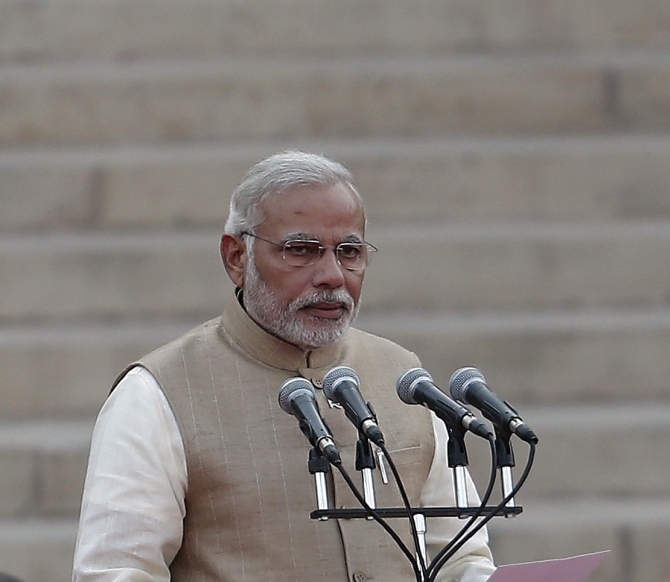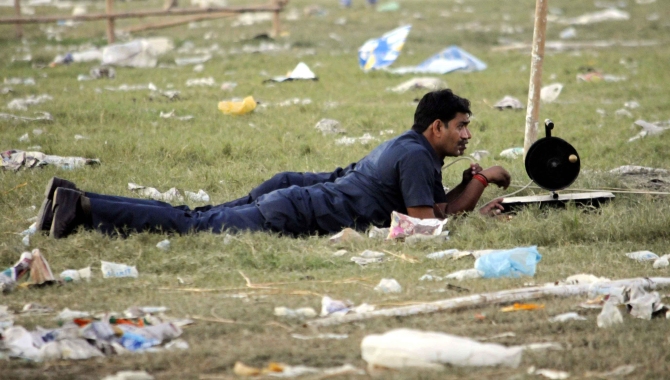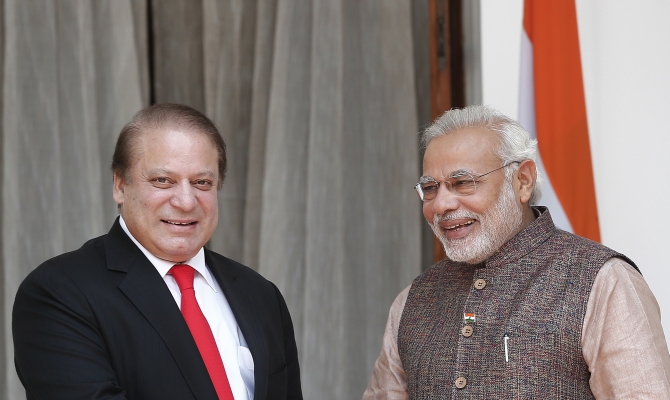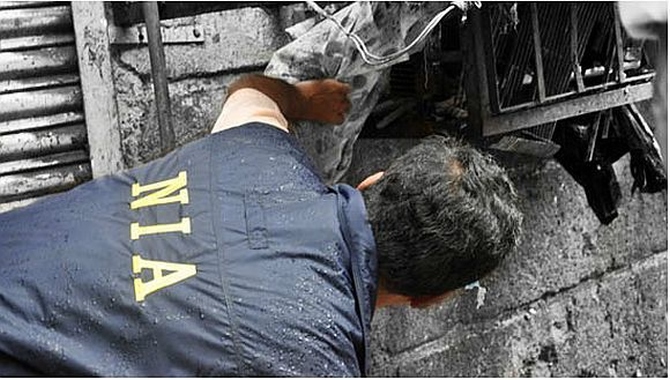 | « Back to article | Print this article |
'The Modi-led BJP govt is on global terror radar'
Inviting Pakistan Prime Minister Nawaz Sharif to India to be a part of his swearing-in ceremony was a masterstroke on Prime Minister Narendra Modi’s part. But will it solve the problem of cross-border terror?
'The new government should be careful in handling homegrown terrorism (Naxalism included), but not through outright repressive measures,' Animesh Roul, executive director, Society for Study of Peace and Conflict, tells Vicky Nanjappa/Rediff.com.
How much of a difference can the new Bharatiya Janata Party government make on terrorism-based issues?
The mood is optimistic, but we should not expect a sea change in policies tackling terrorism/militancy/extremism etc. The BJP, or for that matter any government, doesn’t have that magic wand to control or deter India’s million mutinies. Each problem has its own antidote, so there is no quick-fix or one-window solution to it.
Yes, it is natural to anticipate an iron hand for external aggression and cross-border militancy, especially the threat emanating from Pakistan and Bangladesh. The new government should be careful in handling homegrown terrorism (Naxalism included), but not through outright repressive measures. Better Centre-state coordination is required to tackle these situations successfully.
Click NEXT to read further...
'Jihadi groups will attempt to embarrass the government'
Do you think homegrown terrorist groups and international outfits will spin out of control now that Modi has become prime minister?
These are speculations for two reasons: The BJP’s Hindu-centric nationalist agenda (which is in sharp contrast with the Islamist worldview) and a couple of historical events (such as the Babri Masjid demolition and the 2002 Gujarat riots) that always bring the Islamist attention here, be it from Pakistan or larger transnational jihadist groups.
If we look at the propaganda materials of terrorist groups, of both transnational and indigenous Islamic groups (for example, the Indian Mujahideen), their larger goal is to incite the chunk of so-called alienated and disgruntled Muslim youths in India and jihadi groups look here as a future recruitment ground.
An audiovisual message from militant Islamic outfit Ansar al-Tawheed even cited Modi’s name in particular. So definitely, the Modi-led BJP government is on the global terror radar. Again, it is interesting that terrorist groups are not limiting to Babri or Godhra issues nowadays, but calls to take revenge of other anti-Muslim events in Assam, Hyderabad and even the recent Muzaffarnagar events, irrespective of which regime was at the helm have been made.
Jihadi groups will attempt to challenge and embarrass the government (possibly through high-profile hijacking, assassinations and targeting India’s interests abroad).
The Indian consulate attack in Afghanistan's Herat province was exactly in tune with the AuT’s anti-India call. So the threat has now gone beyond the three most-wanted and dreaded terror triumvirates: Jamaat-ul-Dawa chief Hafiz Saeed, Kashmir-based Hizb-ul-Mujahideen head Syed Salahuddin and Jaish-e-Mohammed leader Masood Azhar). Similarly, we all know about Al chief Al Zawahiri and Tehrik-e-Taliban commander Asim Umar’s calls for Indian Muslims to take up jihad. So the threat to India is and would be multi-pronged in the future.
Click NEXT to read further...
'Modi managed a masterstroke on day one'
Does the new government face a bigger problem from a homegrown terrorist outfit or groups in Pakistan?
Undoubtedly yes. Though the homegrown terrorism already existed before the emergence of the Indian Mujahedeen, the IM threat has surpassed even the Pakistan-sponsored Kashmir-centric terrorism. Most of the Pakistan-based India-centric terrorist groups are in virtual hibernation now, and under pressure from the Pakistan establishment, following the 2008 Mumbai attacks.
They are now engaged in consolidating themselves doing social work, some are even morphed into full-fledged charities and as legitimate socio-religious groups under state patronage.
So homegrown terrorism issue will haunt the present government more and the attacks could be more violent, just to prove a point. So an active policy on deradicalisation of Muslim youths should be in place (it is a growing problem, and might go out of control) and better empowerment strategy, along with coercive measures (search, find and terminate the existing modules of IM/Students Islamic Movement of India). And for that, two things are essential -- robust intelligence infrastructure (human and technical intel gathering, and timely analysis and actions) and better interoperability within existing intel and civic organisations.
How do you think Modi should handle Pakistan?
He managed a masterstroke on day one by inviting the Pakistan prime minster to his swearing-in ceremony. That’s a statesman-like approach. However, we do expect a strong political stand beyond these ceremonial gestures in every aspect that we deal with Pakistan, be it Kashmir, confidence and security-building measures or cross-border militancy and trade. Pushing for the most-wanted fugitives does not help, but forcing or coaxing for counter-measures against them on Pakistan’s soil would help in a longer term. The most favoured nation issue is still pending.
Click NEXT to read further...
'It's not prudent to dissolve the NIA'
The National Investigation Agency appears to be lacking teeth. Do you think the new government should dissolve it or can it add some strength to this organisation?
I think it’s not prudent to dissolve the NIA; rather, efforts should be undertaken to review and fix the lacunae. There is no point in dismantling already-established institutions and starting from scratch all over again. The NIA has had successes in the past, though limited to a couple of high-profile cases.
SIMI appears to be making a comeback and the investigations into the 2013 Patna blasts show that. Do you see it replacing the IM in the days to come?
The network SIMI has in place would be dangerous if it is allowed to morph into a full-fledged terror group. Also, both the SIMI and the IM maintain a symbiotic relation throughout. A SIMI-IM combine is deadlier than anything else. Also, they have the potential to influence the overground mainstream Islamic groups with large followings, even if the latter are not violent or political.
As I said earlier, the deradicalisation process would be vital to bring the disoriented Muslim youths back into the mainstream. Even fringe political and religious groups are exploiting this so-called alienation to their advantage. The government should back new and progressive Muslim non-governmental organisations/education centers which can actually work on the social and economic upliftment of Muslim community, not just playing politics for their own selfish gains.



